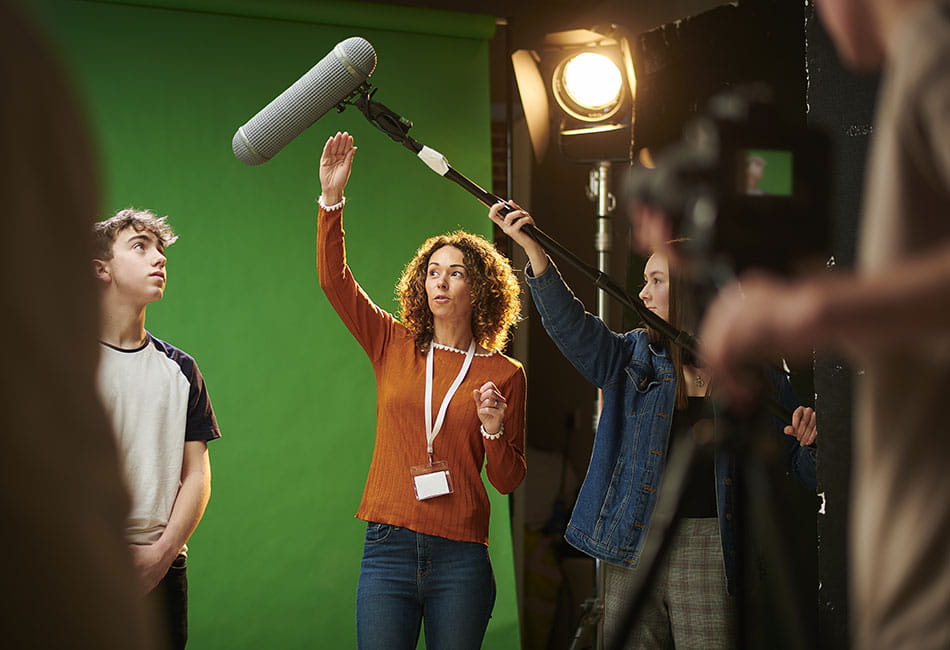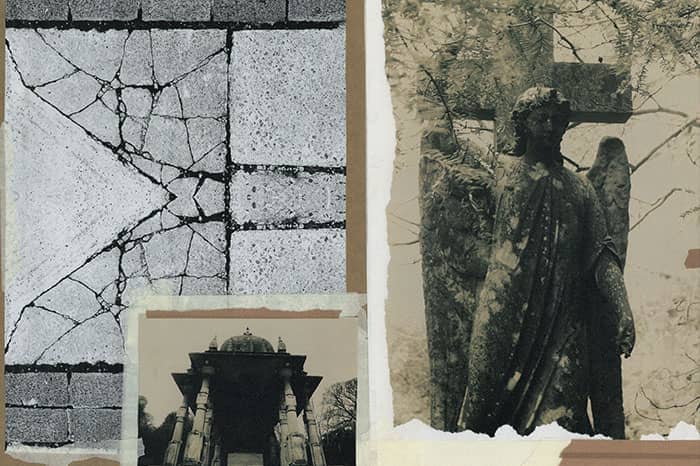
BA(Hons) Media Production
This course is open for applications
About
Develop strong production and research skills, hone in on your particular areas of interest, and carve out a niche as a digital creative media professional in a fast-paced sector.
Why study media production?
Today's employers are in urgent need of graduates with skills in current practices in media, and can produce media content, with a particular focus on digital innovation and emerging technologies.
Studying this subject will give you a broad overview of the industry, as you develop your skills in producing media across a range of formats and platforms from audio to video, and online to broadcasting alongside developing your writing and research capabilities.
You'll learn to think critically and creatively about media, and graduate as a multi-skilled, flexible producer and communicator, in a strong position for building a media career.
Why UWE Bristol?
On BA(Hons) Media Production, you'll work with experienced creative producers, journalists and researchers, as you explore how digital media is embedded in our lives; develop your digital media production skills; and work in the heart of Bristol's vibrant media production and journalism sectors.
You'll be supported to produce work across different platforms; use industry standard software and technology, in everything from social video production and live streaming, to virtual reality and interactive documentary making; and prepare a strong portfolio oriented towards your chosen career.
Working with leading practitioners in the Digital Cultures Research Centre at the Pervasive Media Studio, there'll be exciting opportunities for volunteering, and the chance to gain valuable insight into the professional landscape you're moving into.
You'll take part in live briefs, masterclasses and research, and have access to placements at organisations like Bristol Post, Bristol 24/7, UJIMA Radio and TechSPARK, and possible paid internships with local media partnerships.
And because you'll be based at Bower Ashton Studios, you'll get to connect with peers from related disciplines, as part of our exciting City Campus.
Showcase your work to talent scouts and potential employers at the final year Degree Show.
Where can it take me?
Your expertise in media production, alongside your practical, research and creative thinking skills, will give you the edge in roles as varied as web content production, podcasting and digital media management. You could become a digital media producer or broadcast journalist, or work in social media.
There are opportunities to progress to courses like our MA Journalism, MA Journalism (Audio Docs and Podcasts), and associated MAs.
Student showcase
Watch: Welcome to the School of Arts at UWE Bristol
Entry
Typical offers
You will need to meet the following Level 2 requirements:
- GCSE: Grade C/4 in English, or equivalent.
In addition to the above Level 2 qualifications, you'll need to achieve the published tariff points from your Level 3 studies prior to entry. Below is an indicative list of the main qualification types. However, we will consider any Level 3 qualifications towards meeting our entry requirements.
- Tariff points: 112
- Contextual tariff: See our contextual offers page.
- English Language Requirement:
International and EU applicants are required to have a minimum overall IELTS (Academic) score of 6.0 with 5.5 in each component (or approved equivalent*).
*The university accepts a large number of UK and International Qualifications in place of IELTS. You can find details of acceptable tests and the required grades you'll need on our English Language Requirements page.
- A-level subjects: No specific subjects required.
- EDEXCEL (BTEC) Diploma: No specific subjects required. For information on required Guided Learning Hours please see our minimum entry requirements page.
- Access: No specific subjects required.
- Baccalaureate IB: No specific subjects required. We accept the IB Career-related Programme in conjunction with other Level 3 qualifications.
- Irish Highers: No specific subjects required.
- Welsh Baccalaureate: We accept tariff points achieved from the Advanced Skills Baccalaureate Wales in conjunction with other Level 3 qualifications.
- Cambridge Technical: No specific subjects required.
- T Levels: No specific subjects required.
Entry requirements
International applicants
If you're applying to UWE Bristol from another country or region, visit the international study pages for tailored application information. If you're an international student and don't meet the academic requirements to study this course, you can qualify by completing preparatory study at our International College.
If you're applying to study at UWE Bristol and require additional support to meet our English language requirements, you may be able to attend one of our pre-sessional English courses. Read more about our pre-sessional English Programme.
Read more about entry requirements.
How to apply
Read more about undergraduate applications.
Read more about international applications and key international deadline dates.
For further information
- Email:
UK applicants
Admissions@uwe.ac.uk
International/EU applicants
International@uwe.ac.uk - Telephone:
UK applicants
+44 (0)117 32 83333
International/EU applicants
+44 (0)117 32 86644
Structure
Content
You'll study:
Creative Contexts
You'll gain insight into the knowledge, research and skills expected within the creative industries by exploring interdisciplinary methods of working, contexts for communication, group dynamics, collaboration, co-creation, and reflection
Introduction to Media Production
You'll be introduced to the fundamentals of digital content production focusing on visual design and lens-based media - such as photography and videography skills; editing and video production; graphic design and critical reflection of practice.
Audio and Storytelling
You'll discover the fundamentals of audio production, developing your storytelling via the use of audio, including researching and developing stories, working with contributors and scriptwriting.
Understanding Media
You'll consider the forces shaping your future as media professionals and how digital media can provide a platform to address contemporary issues.
You'll study:
Creative Futures
You'll develop the skills to undertake research in the screen industries, developing project planning skills and focusing on the elements of screen industries that are of most interest to you.
Media Industries
You'll be equipped to work in the wider media industries, by exploring contemporary debates in media business and entrepreneurship; media regulation; legal and ethical frameworks and the role of international, national and regional media ecosystems.
Video Production
You'll gain a comprehensive overview of critical approaches to making and developing video production artefacts, identifying and questioning the role of the audience and how image and sound communicate with different audiences through different forms.
Participatory and Interactive Media
This module will provide you with a historical and theoretical introduction as well as a practical training in participatory and interactive media production.
Optional modules:
Placement year (if applicable)
If you study on the four year (sandwich) course, you'll spend a year away from the University on a work placement after Year two.
You'll study the Professional Development on Placement module.
See the placements and fees sections for more information.
You'll study:
Creative Research Project
You'll focus on a research project relating to your specific interests, building on the knowledge gained in previous years and developing skills required by employers such as proactive learning, independence and delivering research and practice to a high standard.
Live Studio Production
You'll work as part of a live studio-based production team on a TV or radio programme of your own devising within a particular specialism, developing your skills collaboratively, whilst being encouraged to reflect critically on your own contributions.
Specialist Media
Building upon content creation skills acquired in previous modules, you'll explore specialist fields of media production across a range of platforms (print, video and podcasting) and build expertise in a specialist area of your choice.
Optional modules:
Plus, optional modules (the amount depending on credit requirement)* from:
- Digital Marketing and Content Production*
- Sound, Image, Space.*
*If you complete the sandwich placement year, neither of these modules will be available to study. If you don't complete it, then you'll study one of them.
The optional modules listed are those that are most likely to be available, but they may be subject to change.
This structure is for full-time students only. Part-time students study the same modules but the delivery pattern will be different.
The University continually enhances our offer by responding to feedback from our students and other stakeholders, ensuring the curriculum is kept up to date and our graduates are equipped with the knowledge and skills they need for the real world. This may result in changes to the course. If changes to your course are approved, we'll inform you.
Learning and Teaching
Teaching
The learning outcomes for this course are met through a balance of active teaching and learning methods that take place in timetabled sessions as well as tutorial support and independent study.
You'll learn through taking part in activities led or facilitated by members of the academic and technical instruction teams. These include lectures, seminars, tutorials, presentations, peer critiques, technical workshops, and practical studio time as well as off-site visits and events. These sessions will be primarily face-to-face and take place using teaching and technical resources on-campus, although blended learning methods may be used to enhance your learning experience on the course.
Independent learning
One difference between school or college and university is your ownership of your independent study time, where you'll be expected to prepare for scheduled sessions through activities such as course and content creation, research tasks and the preparation of materials for assessment. Independent study time tends to increase as you progress through your levels of study, to reflect an increased emphasis on self-directed study.
Contact hours
In a typical week in your first year, you could expect to be timetabled with academic and technical staff for an average of 12 hours, with the expectation that you'll also work on practice and assessment tasks through independent self-study for an additional 12-18 hours. The balance between taught sessions and independent study in your timetables may vary between modules and at points across the academic year, to enable both the development of new skills, concepts, and knowledges and to facilitate the space for the production of assessment tasks.
See our full glossary of learning and teaching terms.
Study time
You'll attend 10 to 12 hours of class activities each week.
Outside class, you'll be expected to undertake course readings and complete writing and research exercises, essays, production exercises and projects.
Assessment
There are no formal exams on this course. Instead, we use a variety of assessments that will enable you to show how you are developing as a creative, professional practitioner as well as a reflective and critical thinker.
We prepare you to work across a range of different mediums, including video, audio, interactive and graphic design work, either individually or in groups. In addition to this, you may be asked to produce presentations, reports, video essays and reflective accounts of your creative practice. These assessments take place at key points in the module. In some modules you may asked to take part in industry-based simulations such as news days and in-studio assessments. In addition, formative assessment is offered throughout the module to enable you to track your progress and help you develop assessment tasks.
Learn more about assessments.
Fees
Full-time, sandwich course
Indicative Additional Costs
Part time course
Supplementary fee information
Your overall entitlement to funding is based on how long the course is that you're registered on.
Standard funding is allocated based on the standard number of years that your course lasts, plus one additional year.
You'll apply for funding each year that you study and Student Finance will take into account how long the course is in each year that you apply. So if you register for the four year course and then transfer to the three year course, the number of years you can apply for funding will change. Student Finance will reassess your funding based on how many years you have been in study, not just those years for which you received student finance.
Always seek advice before taking any action that may have implications for your funding.
Additional costs
This refers to items you could need during your studies that aren't covered by the standard tuition fee.
These could be materials, textbooks, travel, clothing, software or printing.
Features
Placements
Students who get work experience tend to graduate with better degrees. Experience also hones your skills, industry knowledge and professional network, making you a sought after graduate.
You'll engage with the vibrant urban and media culture of Bristol. We'll encourage you to take up work placements, internships and volunteering; and our industry contacts include the Pervasive Media Studio, the BBC, South West News Service and many regional media companies.
Work opportunities for students will be published throughout the course and are a great way to build your CV and experience before you graduate.
There's also the option to do a summer work placement or spend a year in work as part of our sandwich year option.
Get help to find your placements and support throughout from department staff and our award-winning careers service.
Study facilities
Study at Bower Ashton Studios, as part of our City Campus, which also includes Bristol's contemporary art centres Spike Island, Arnolfini and Watershed.
You'll have access to exceptional facilities and resources at Bower Ashton including:
- industry standard digital media studios and print facilities
- high-definition digital cameras for projects
- specialist software in the studio for editing audio and visual material
- computer labs with further facilities for producing work, with friendly technical support
- our creative and cultural industries library
- student support services.
You'll also attend lectures and seminars at the Arnolfini and Watershed in Bristol city centre.
Our City Campus connects teaching and learning with some of the best production and cultural organisations in Bristol. The mix of traditional and hands-on learning environments helps you quickly take on essential knowledge and skills, standing you in good stead for your professional career.
Learn more about UWE Bristol's facilities and resources.
Take a personalised virtual tour of the Filmmaking, Animation and Photography and experience what a typical day could look like here for you.
Personalised virtual tour
There's no need to visit us in person to explore our facilities and campuses. Take a personalised virtual tour and discover it all for yourself from wherever you are.
Take a virtual tourCareers
Careers / Further study
Tailoring what and how you study, you can shape the course towards your chosen career path.
You'll graduate with the skills and experience to work in varied digital production contexts, either in large organisations such as the BBC, Bristol Sport or Aardman, or in small-to medium sized media and production companies.
You could go into areas such as web content production, podcasting or digital media management; produce digital content for cultural organisations such as museums, the public sector, charities or corporates; or progress into broadcast journalism, online media production, social media or education.
As this is an industry that's constantly evolving, we'll also prepare you for where the market is heading.
You could go on to do a postgraduate qualification, such as our MA Journalism, MA Journalism (Audio Docs and Podcasts) or associated MAs - or embark on teacher training.
Get inspired
Our award-winning careers service will develop your employment potential through career coaching and find you graduate jobs, placements and global opportunities.
We can also help find local volunteering and community opportunities, provide support for entrepreneurial activity and get you access to employer events.
Visit our employability pages to learn more about careers, employers and what our students are doing six months after graduating.
How to be a broadcaster - Angellica Bell
Life

Accommodation
An excellent range of options for all of the Bristol campuses and the city centre.

Bristol
A stunning city for student living with all the qualities to make you want to stay.

Sports, societies and activities
There is more to your experience here than study. Choose to make the most of it and try new things.

Health and Wellbeing
We provide support in the way you need it.

Campus and facilities
Discover our campuses and the wealth of facilities provided for our students.

